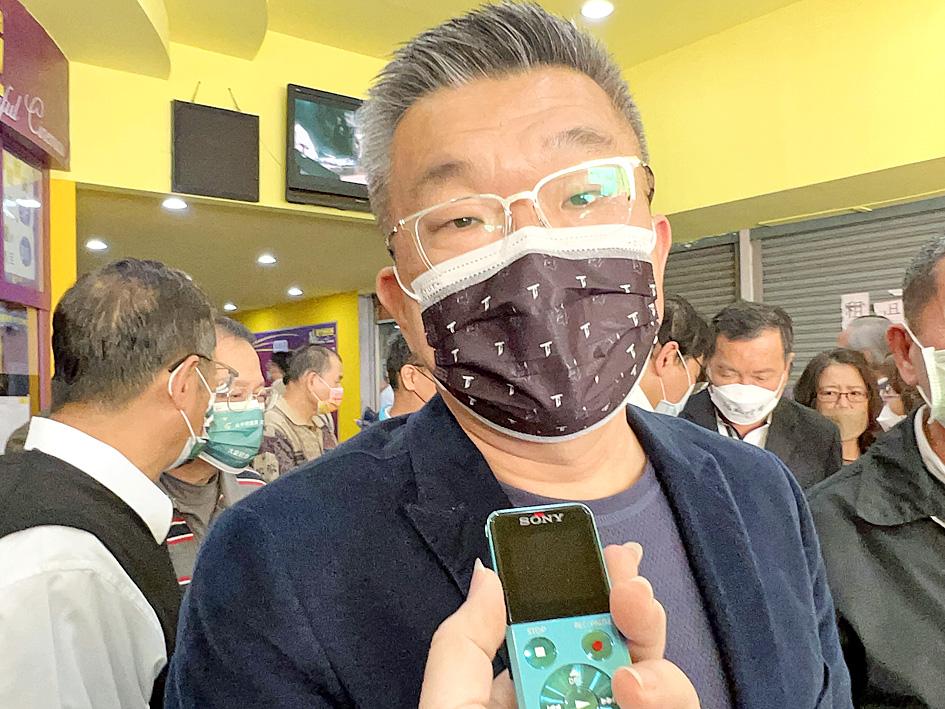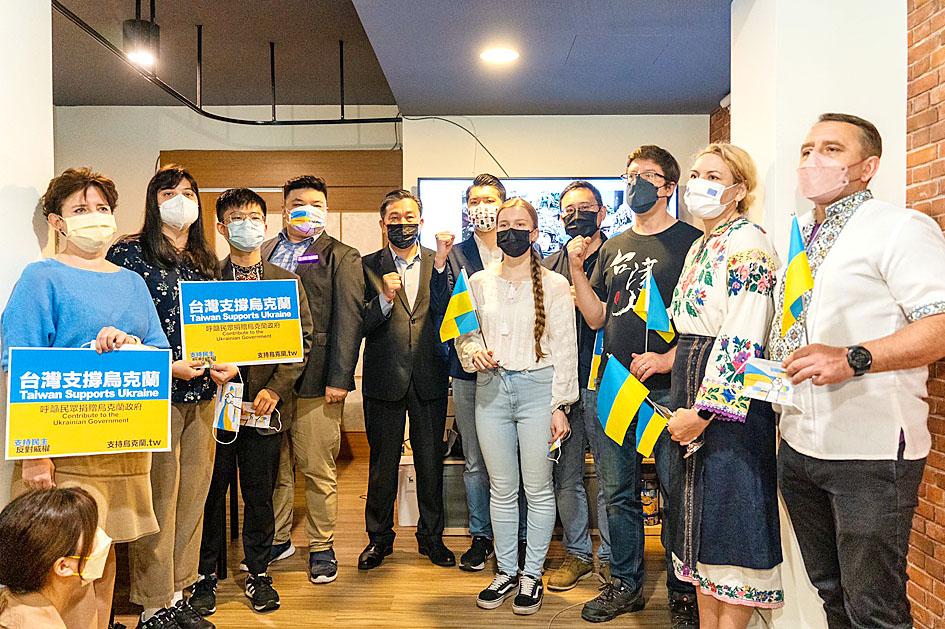Legislative Yuan Deputy Speaker Tsai Chi-chang (蔡其昌) yesterday said that he has raised NT$10 million (US$356,875) to fund humanitarian aid for Ukrainian refugees in Poland, adding that more funds would be welcome.
A “Taiwan Can Help” news conference is to be held at the legislature in Taipei today to announce the donation, which was made by more than 10 Taiwanese firms, Tsai said.
“The Russian invasion of Ukraine has shown us the cruelty and bloodshed of war, and how families are torn apart by it. My friends in business and I have raised NT$10 million and hope that this will be timely help for Ukrainian refugees who have fled to Poland,” Tsai said.

Photo: CNA
After discussions with the Ministry of Foreign Affairs, the firms decided that the funds should be distributed to the refugees through coordination between Taiwanese and Polish humanitarian groups.
“I believe that Taiwan should offer help when other nations are in trouble, and vice versa,” Tsai said. “It is like when we donated masks to other nations during the COVID-19 pandemic, and other nations donated vaccines when we needed them most. This is a cycle of kindness. Taiwan can help these refugees. We can do this.”
Tsai said that today’s news conference would also be used to encourage more Taiwanese firms to donate funds.

Photo courtesy of Vincent Chao’s office
Mechema Chemicals International Corp (美琪瑪國際), Mobiletron Co (車王電子), Elan Microelectronics Corp (義隆電子), Kang Si Biotech (康舒生技) and Puyung Archiland (璞永建設) were reported to be among the donors.
Separately, a fundraising platform to collect donations for Ukraine has been launched.
Established by former representative to the US Vincent Chao (趙怡翔), Keep Taiwan Free founder Sean Su (蘇襄), New Taipei City councilor candidate Lee Yu-hsiang (李宇翔) and Taiwan-based Ukrainian entrepreneur Alex Khomenko, supportukraine.tw accepts donations by credit card or bank transfer to help the Ukrainian government and other organizations working in the nation.
Having experienced the pain of its authoritarian past, Taiwan has a responsibility and obligation to help other democratic nations resist authoritarian aggression, Chao said.
“The bullets are flying [in Ukraine] at civilians, buildings, hospitals and orphanages. I sometimes don’t know if I’m going to see my family again,” one Ukrainian living in Taiwan said in Taipei yesterday at a news conference announcing the platform.
“I felt powerless, I didn’t know what to do... If you can, please donate money to support the Ukrainian military,” another said.
Earlier, Democratic Progressive Party Legislator Chao Tien-ling (趙天麟) on Sunday said that the government would check on Ukrainian students in Taiwan to see if they need financial support after a Ukrainian woman appealed for help from the government.
Chao said that he had contacted the Ministry of Foreign Affairs and the Ministry of Education, and the education ministry said that it would check how many Ukrainian students need help.
Meanwhile, Taiwan’s professional baseball league, the CPBL, has changed the colors of its logo to yellow and blue in support of Ukraine.
“As Taiwan’s largest sports league, the change was a response to the Ukrainian people’s hope for peace,” the league wrote on Facebook. “We feel the threat and pressure of the Ukrainian people, and believe we need to stand with them as their sovereignty and freedoms are being breached.”
Additional reporting by the CNA

A magnitude 7.0 earthquake struck off Yilan at 11:05pm yesterday, the Central Weather Administration (CWA) said. The epicenter was located at sea, about 32.3km east of Yilan County Hall, at a depth of 72.8km, CWA data showed There were no immediate reports of damage. The intensity of the quake, which gauges the actual effect of a seismic event, measured 4 in Yilan County area on Taiwan’s seven-tier intensity scale, the data showed. It measured 4 in other parts of eastern, northern and central Taiwan as well as Tainan, and 3 in Kaohsiung and Pingtung County, and 2 in Lienchiang and Penghu counties and 1

FOREIGN INTERFERENCE: Beijing would likely intensify public opinion warfare in next year’s local elections to prevent Lai from getting re-elected, the ‘Yomiuri Shimbun’ said Internal documents from a Chinese artificial intelligence (AI) company indicated that China has been using the technology to intervene in foreign elections, including propaganda targeting Taiwan’s local elections next year and presidential elections in 2028, a Japanese newspaper reported yesterday. The Institute of National Security of Vanderbilt University obtained nearly 400 pages of documents from GoLaxy, a company with ties to the Chinese government, and found evidence that it had apparently deployed sophisticated, AI-driven propaganda campaigns in Hong Kong and Taiwan to shape public opinion, the Yomiuri Shimbun reported. GoLaxy provides insights, situation analysis and public opinion-shaping technology by conducting network surveillance

‘POLITICAL GAME’: DPP lawmakers said the motion would not meet the legislative threshold needed, and accused the KMT and the TPP of trivializing the Constitution The Legislative Yuan yesterday approved a motion to initiate impeachment proceedings against President William Lai (賴清德), saying he had undermined Taiwan’s constitutional order and democracy. The motion was approved 61-50 by lawmakers from the main opposition Chinese Nationalist Party (KMT) and the smaller Taiwan People’s Party (TPP), who together hold a legislative majority. Under the motion, a roll call vote for impeachment would be held on May 19 next year, after various hearings are held and Lai is given the chance to defend himself. The move came after Lai on Monday last week did not promulgate an amendment passed by the legislature that

AFTERMATH: The Taipei City Government said it received 39 minor incident reports including gas leaks, water leaks and outages, and a damaged traffic signal A magnitude 7.0 earthquake struck off Taiwan’s northeastern coast late on Saturday, producing only two major aftershocks as of yesterday noon, the Central Weather Administration (CWA) said. The limited aftershocks contrast with last year’s major earthquake in Hualien County, as Saturday’s earthquake occurred at a greater depth in a subduction zone. Saturday’s earthquake struck at 11:05pm, with its hypocenter about 32.3km east of Yilan County Hall, at a depth of 72.8km. Shaking was felt in 17 administrative regions north of Tainan and in eastern Taiwan, reaching intensity level 4 on Taiwan’s seven-tier seismic scale, the CWA said. In Hualien, the